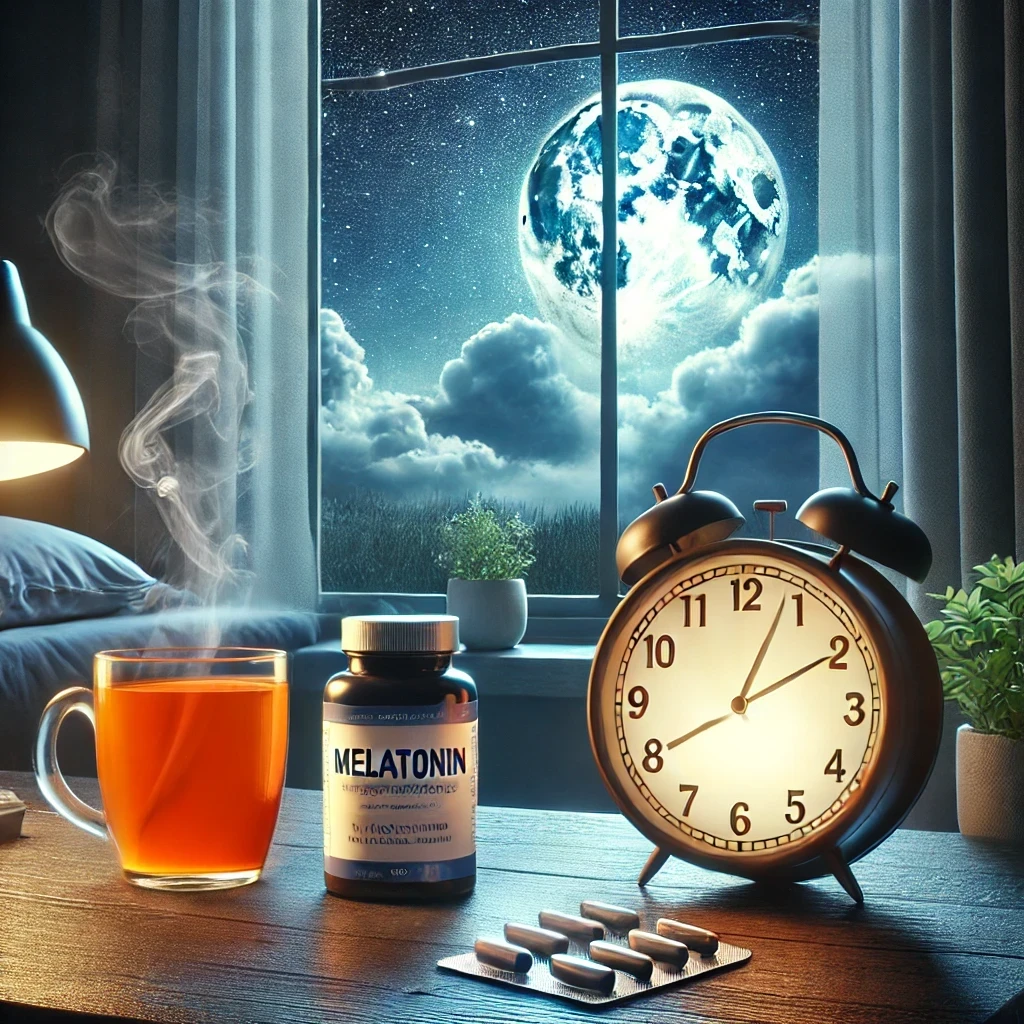Introduction
Sleep is the cornerstone of physical and mental health. It is a vital process during which the body repairs cells, restores energy, and enhances overall well-being. However, many people struggle with sleep disorders that leave them drained and unable to perform daily tasks effectively. Whether you experience insomnia, recurring nightmares, or frequent nighttime awakenings, these issues may signal an underlying imbalance that requires attention.
In this article, we will delve into the causes of sleep disorders and provide natural, practical solutions based on scientific evidence. If you’re looking to achieve peaceful and restful sleep, this comprehensive guide will help you understand the root causes of the problem and work towards sustainably improving your sleep quality.
Causes of Sleep Disorders
1. Night-time Stress and Anxiety

Stress is one of the most common causes of sleep disorders. When stress or anxiety levels rise, the body releases hormones like cortisol and adrenaline, which elevate heart rate and overactivate the nervous system, making it difficult to enter deep sleep.
Nighttime anxiety is another major contributor to sleep disorders, often intensifying as the mind fixates on daily challenges or future uncertainties, such as financial or social concerns. This results in “racing thoughts,” where negative ideas overwhelm the mind, preventing relaxation and making restful sleep feel unattainable.
2. Unbalanced Diet
Dietary habits are significant causes of sleep disorders, as what we eat and when we eat greatly influence sleep quality. Consuming heavy or sugary meals close to bedtime activates the digestive system, leading to discomfort that can disrupt restful sleep.
Stimulants like caffeine, commonly found in coffee, tea, and soda, are another major contributor to sleep disorders. Caffeine can remain in the body for up to 8 hours, interfering with the ability to fall asleep. Similarly, nicotine from cigarettes overstimulates the nervous system, further hindering deep and restorative sleep.
3. Use of Electronic Devices Before Bed
the use of electronic devices is one of major causes of sleep disorders. The blue light emitted by screens on smartphones, tablets, and computers disrupts melatonin production, the hormone responsible for regulating the sleep-wake cycle. This interference makes it harder for the body to prepare for sleep.
Additionally, activities such as scrolling through social media or reading stressful news before bedtime contribute to elevated stress and anxiety levels. This mental stimulation prevents the brain from relaxing, further exacerbating sleep difficulties. These combined factors make electronic devices a common and impactful cause of disrupted sleep.
4. Chronic Insomnia
Chronic insomnia is a significant cause of sleep disorders, characterized by long-term difficulty in falling or staying asleep. It is frequently associated with psychological conditions such as anxiety and depression or physical health issues like chronic pain or respiratory problems.
Over time, the persistent worry about not being able to sleep creates a vicious cycle, intensifying the insomnia and making it harder to break free from the condition. This ongoing struggle makes chronic insomnia one of the most challenging causes of disrupted sleep.
5. Sleep Apnea
one of the prevalent causes of sleep disorders, characterized by repeated interruptions in breathing during sleep. These pauses in breathing reduce oxygen levels in the blood, prompting the brain to wake the person multiple times throughout the night to resume normal breathing.
This cycle of frequent awakenings prevents the body from entering deep and restorative sleep, resulting in constant fatigue and daytime drowsiness. As a common medical condition, sleep apnea significantly impacts overall sleep quality and contributes to chronic sleep disruptions.
6. Uncomfortable Sleep Environment
The sleep environment is a crucial cause of sleep disorders, as it directly influences sleep quality. Disruptive noises, such as traffic or household appliances, can interrupt sleep cycles, leading to poor rest.
Temperature is another critical factor; if the room is too hot or too cold, it becomes challenging for the body to relax and prepare for sleep. Additionally, uncomfortable bedding, such as poorly supportive pillows or mattresses, can cause physical discomfort, further hindering restful and uninterrupted sleep. Creating an optimal sleep environment is essential to prevent these disturbances.
7. Shift Work
Shift work is of a significant causes of sleep disorders, particularly for individuals who work on rotating or irregular schedules. The constant changes in work hours disrupt the body’s internal clock, or circadian rhythm, making it difficult to synchronize with natural sleep patterns.
This misalignment often results in chronic insomnia, persistent fatigue, and long-term health risks, including an increased likelihood of developing heart disease. Shift work creates ongoing challenges in achieving restful and consistent sleep, making it a major contributor to sleep disturbances.
8. Physical Illnesses
Chronic medical conditions are common causes of sleep disorders, as they make achieving restful sleep particularly difficult. Issues such as asthma, arthritis, or back pain can disrupt sleep by causing discomfort or difficulty breathing.
Breathing problems, including snoring or sleep apnea, lead to frequent awakenings during the night, while joint or muscle pain often prevents finding a comfortable sleep position. These physical challenges significantly impact the ability to enjoy uninterrupted and restorative sleep.
9. Hormonal Changes
Hormonal fluctuations are significant causes of sleep disorders, particularly for women. During menstruation or pregnancy, shifts in hormone levels often result in insomnia or difficulty falling asleep.
Menopause, which involves a reduction in estrogen levels, frequently leads to hot flashes and night sweats, further disrupting sleep patterns. These hormonal changes are among the most common causes of sleep disorders, making restful and uninterrupted sleep difficult to achieve.
10. Medications and Side Effects
Certain medications are notable causes of sleep disorders, as they can lead to sleep disturbances as a side effect. For example, antidepressants and blood pressure treatments are commonly associated with disruptions in sleep patterns.
To minimize these effects, it’s crucial to review the medication guidelines and consult with a healthcare provider to explore alternative treatments or adjustments if necessary. Addressing medication-induced sleep disturbances is essential for restoring healthy sleep cycles.
The Effects of Sleep Disorders
- Cognitive Decline: Sleep disorders impair focus, memory, and decision-making.
- Weakened Immunity: Poor sleep lowers the body’s ability to fight infections, increasing susceptibility to illnesses.
- Heart Issues: Sleep disturbances are linked to high blood pressure, increasing the risk of heart attacks and strokes.
- Weight Gain: Sleep disorders disrupt appetite-regulating hormones, leading to increased hunger and overeating.
- Mental Health Impact: Lack of sleep exacerbates symptoms of anxiety and depression, making individuals more prone to stress.
Natural Solutions to Improve Sleep Quality
1. Establishing a Consistent Sleep Routine
A consistent sleep routine is essential and helps address the causes of sleep disorders over the long term. Set fixed times for sleeping and waking up, even on weekends, to align your body’s internal clock. When your body adjusts to a regular schedule, falling asleep and waking up become much easier.
Dedicate time before bed to relaxing activities such as reading a book, listening to soothing music, or practicing meditation, and avoid stimulating or stressful tasks at least an hour before sleep.
2. Creating a Comfortable Sleep Environment
An optimal sleep environment can counter many causes of sleep disorders. Ensure your bedroom is completely dark by using blackout curtains or a sleep mask if necessary.
Maintain a cool room temperature, ideally between 18-20°C (64-68°F), to enhance comfort. Invest in supportive pillows and mattresses to reduce physical discomfort. If external noise is an issue, try earplugs or a white noise machine to block disturbances.
3. Reducing Caffeine and Stimulants
Caffeine is a leading contributor to many causes of sleep disorders due to its stimulating effects on the nervous system. Avoid coffee, tea, or soda containing caffeine after 2 PM if you have trouble sleeping.
4. Practicing Relaxation Techniques
Relaxation techniques effectively tackle stress and anxiety, which are significant causes of sleep disorders. Practice mindfulness meditation or deep breathing exercises before bed. Spend 15-20 minutes in a quiet space, close your eyes, and focus on slow, deep breathing.
You can also try gentle yoga or muscle stretching to relieve physical tension and prepare your body for rest. These methods improve both sleep quality and overall health.
5. Eating Sleep-Supportive Foods
Certain foods help mitigate the causes of sleep disorders by promoting melatonin production. A light snack combining carbohydrates and protein, such as yogurt with honey or whole-grain toast with peanut butter, can improve sleep. Avoid heavy, spicy, or fatty foods at night, as they can cause digestive discomfort and interfere with sleep.
6. Relying on Natural Herbs
Natural herbs like chamomile, lavender, and lemon balm are effective remedies for some causes of sleep disorders, thanks to their calming properties. A warm cup of chamomile tea before bed can ease tension and prepare your body for sleep.
7. Exposure to Natural Light
Exposure to sunlight in the morning helps regulate the body’s internal clock, addressing one of the primary causes of sleep disorders. Sunlight stimulates melatonin production at night, promoting better sleep. If you work indoors, try spending a few minutes outside daily or sitting near a sunny window to enhance your sleep quality.
8. Daily Exercise
Regular physical activity reduces stress and improves relaxation, targeting key causes of sleep disorders. Exercise in the morning or afternoon for maximum benefit, as exercising too close to bedtime may stimulate the body and interfere with sleep.
9. Taking a Warm Bath
A warm bath before bed helps relax muscles and reduce tension, addressing several causes of sleep disorders. Bathing also lowers your body temperature gradually afterward, signaling that it’s time for rest. Adding essential oils like lavender to your bath enhances its calming effect.
10. Avoiding Long Naps
Long daytime naps can contribute to the causes of sleep disorders by disrupting your nighttime sleep cycle. If you need a nap, keep it short (15-30 minutes) and take it earlier in the day to avoid interfering with your ability to sleep at night.
By adopting these natural solutions, you can effectively counteract the causes of sleep disorders and improve your overall sleep quality.
Conclusion: Overcome Sleep Disorders to Improve Your Quality of Life
Sleep disorders can deeply impact all aspects of your life, from your physical health to your daily performance and emotional well-being. The good news is that there are numerous natural solutions you can adopt to significantly enhance your sleep quality.
Start by identifying the primary causes of sleep disorders affecting you, whether it’s stress, your environment, or daily habits. Gradually implement the recommended solutions while maintaining a consistent routine that promotes relaxation and comfort. Remember, sleep is not a luxury—it is a vital necessity for improving your overall health and boosting your daily happiness.
If you’ve tried these solutions without success, it may be time to consult a sleep disorder specialist. Sometimes, underlying medical conditions require professional intervention. Don’t hesitate to seek help to ensure you achieve restful and sustainable sleep.
Share this article with friends and family to spread awareness about the importance of sleep as an essential part of a healthy and happy life.
Read more
Good Sleep:7 Secrets and Habits for Comfortable and Deep Sleep
Top 10 Most Used Supplements to Improve Sleeping and Enhance Sleep Quality

















